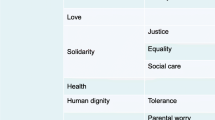Abstract
Reproductive autonomy, medicalization, and discrimination against disabled and parental responsibility are the main ongoing ethical debates concerning reproductive genetic screening. To examine Swedish healthcare professionals’ views on preconception expanded carrier screening (ECS), a qualitative study involving academic and clinical institutions in Sweden was conducted in September 2014 to February 2015. Eleven healthcare professionals including clinicians, geneticists, a midwife, and a genetic counselor were interviewed in depth using a semi-structured interview guide. The questionnaire was constructed after reviewing the main literature and meetings with relevant healthcare providers. The interviews were recorded, transcribed verbatim, and content analyzed for categories and subcategories. Participants nurtured many ethical and non-ethical concerns regarding preconception ECS. Among the ethical concerns were the potential for discrimination, medicalization, concerns with prioritization of healthcare resources, and effects on reproductive freedom. The effects of implementation of preconception ECS, its stakeholders, regulations, and motivation are some of non-ethical concerns. These concerns, if not addressed, may affect the uptake and usage of carrier screening within Swedish healthcare system. As this is a qualitative study with a small non-random sample size, the findings cannot be generalized. The participants had little to no working experience with expanded screening panels. Moreover, the interviews were conducted in English, a second language for the participants, which might have limited the expression of their views. However, the authors claim that the findings may be pertinent to similar settings in other Scandinavian countries.
Similar content being viewed by others
References
Benn P, Chapman AR, Erickson K et al (2013) Obstetricians and gynecologists’ practice and opinions of expanded carrier testing and noninvasive prenatal testing. Prenatal Diagnosis Prenat Diagn 34:145–152
Borry P, Henneman L, Lakeman P et al (2011) Preconceptional genetic carrier testing and the commercial offer directly-to-consumers. Hum Reprod 26:972–977
Burström B (2015) Sweden—recent changes in welfare state arrangements. Int J Health Serv 45(1):87–104
Castellani C, Macek M, Cassiman JJ et al (2010) Benchmarks for cystic fibrosis carrier screening: a european consensus document. J Cyst Fibros 9:165–178
Cho D, Mcgowan ML, Metcalfe J, Sharp RR (2013) Expanded carrier screening in reproductive healthcare: perspectives from genetics professionals. Hum Reprod 28:1725–1730
Clarkeburn H (2000) Parental duties and untreatable genetic conditions. J Med Ethics 26:400–403
De Wert GMWR, Dondorp WJ, Knoppers BM (2011) Preconception care and genetic risk: ethical issues. J Commun Genet 3:221–228
Edwards JG, Feldman G, Goldberg J et al (2015) Expanded carrier screening in reproductive medicine—points to consider. Obstet Gynecol 125:653–662
Eriksson S (2014) Forskningsetisk prövning. In: CODEX. http://www.codex.vr.se/manniska5.shtml, & http://www.epn.se/media/1205/the_ethical_review_act.pdf, Aug 2015
Fredriksson M (2012) Between equity and local autonomy: a governance dilemma in swedish healthcare. Acta Universitatis Upsaliensis, Uppsala
Graneheim U, Lundman B (2004) Qualitative content analysis in nursing research: concepts, procedures and measures to achieve trustworthiness. Nurse Educ Today 24:105–112
Grody WW, Thompson BH, Gregg AR et al (2013) ACMG position statement on prenatal/preconception expanded carrier screening. Obstet Gynecol Survey 15:785–787
Guest G, Bunce A, Johnson L (2006) How many interviews are enough?: an experiment with data saturation and variability. Field Methods 18:59–82
Health Council of the Netherlands (2007) Preconception care: a good beginning. The Hague: Health Council of the Netherlands. publication no. 2007/19E: 81–86
Juth N, Munthe C (2011) The ethics of screening in health care and medicine: serving society or serving the patient? (Vol. 51): Springer Science & Business Media
Kingsmore S (2012) Comprehensive carrier screening and molecular diagnostic testing for recessive childhood diseases 4
Langlois S, Benn P, Wilkins-Haug L (2015) Current controversies in prenatal diagnosis 4: pre-conception expanded carrier screening should replace all current prenatal screening for specific single gene disorders. Prenatal Diagnosis Prenat Diagn 35:23–28
Matthijs G, Souche E, Alders M, Corveleyn A, Eck S, Feenstra I, Yntema H (2016) Guidelines for diagnostic next-generation sequencing. Eur J Hum Genet 24(1):2–5
Mcdougall R (2007) Parental virtue: a new way of thinking about the morality of reproductive actions. Bioethics 21:181–19
Ormond KE, Iris M, Banuvar S et al (2007) What do patients prefer: informed consent models for genetic carrier testing. J Genet Counsel 16:539–550
Ormond KE, Banuvar S, Daly A et al (2009) Information preferences of high literacy pregnant women regarding informed consent models for genetic carrier screening. Patient Educ Couns 75:244–250
Raz AE, Vizner Y (2008) Carrier matching and collective socialization in community genetics: Dor yeshorim and the reinforcement of stigma. Soc Sci Med 67(9):1361–1369
Ready K, Haque IS, Srinivasan BS, Marshall JR (2012) Knowledge and attitudes regarding expanded genetic carrier screening among women’s healthcare providers. Fertil Steril 97:407–413
Savulescu J, Kahane G (2009) The moral obligation to create children with the best chance of the best life. Bioethics 23:274–290
Schoen C, Santolaya-Forgas J, Genc M, Ashkinadze E (2014) Differential utilization of expanded genetic screening tests in patients of reproductive ages from private and academic practices.
Scully JL (2008) Disability and genetics in the era of genomic medicine. Nat Rev Genet 9:797–802
The Ministry of Education and Cultural Affairs (2003) The act concerning the ethical review of research involving humans (2003:460). In: The ethical Review Act. http://www.epn.se/media/1205/the_ethical_review_act.pdf. 2015
University Medical Center Groningen (2015) Research lines. In: PCS pilot study: Preconception screening of couples wishing to start a family. http://www.rug.nl/research/genetics/research/pcs-pilot-study?lang=en. Aug 2015
Van Der Zee B, Beaufort ID (2011) Preconception care: a parenting protocol. A moral inquiry into the responsibilities of future parents towards their future children. Bioethics 25:451–457
van El CG, Cornel MC, Borry P, Hastings RJ, Fellmann F, Hodgson SV, Scheffer H (2013) Whole-genome sequencing in health care. Eur J Hum Genet 21:S1–S5
Wasserman D (2005) The nonidentity problem, disability, and the role morality of prospective parents. Ethics 116:132–152
Wilfond BS, Nolan K (1993) National policy development for the clinical application of genetic diagnostic technologies. JAMA 270:2948–2948
World Medical Association (2013) World medical association declaration of Helsinki: ethical principles for medical research involving human subjects. JAMA 310:2191–2191
Zlotogora J (2009) Population programs for the detection of couples at risk for severe monogenic genetic diseases. Hum Genet 126:247–253
Study funding and acknowledgments
This research was supported by Uppsala University, Sweden. The authors would like to extend their thanks to respondents who took time of their busy schedules to participate in the study.
Author’s roles
A. M.: main contributions to conception, design, acquisition of data, analysis, and interpretation of data; drafting the manuscript and revising it, and final approval of the version to be published.
U. K.: assist with the conception and design. Revising it critically for important intellectual content, and final approval of the version to be published.
A. T. H.: contributions to the design, assist with analysis and interpretation of data; revising it critically for important intellectual content, and final approval of the version to be published.
Author information
Authors and Affiliations
Corresponding author
Ethics declarations
Funding
This research was funded by Uppsala University, Sweden.
Conflicts of interest
Author AM declares no conflict of interest. Author UK declares no conflict of interest. Author ATH declares no conflict of interest.
Ethical approval
This study involved human participants. All procedures were in accordance with the ethical standards of the institutional and/or national research committee and with the 1964 Helsinki Declaration and its later amendments or comparable ethical standards.
Informed consent
Verbal informed consent was obtained from all individual participants included in the study.
This article does not contain any studies with animals performed by any of the authors.
Rights and permissions
About this article
Cite this article
Matar, A., Kihlbom, U. & Höglund, A.T. Swedish healthcare providers’ perceptions of preconception expanded carrier screening (ECS)—a qualitative study. J Community Genet 7, 203–214 (2016). https://doi.org/10.1007/s12687-016-0268-2
Received:
Accepted:
Published:
Issue Date:
DOI: https://doi.org/10.1007/s12687-016-0268-2




